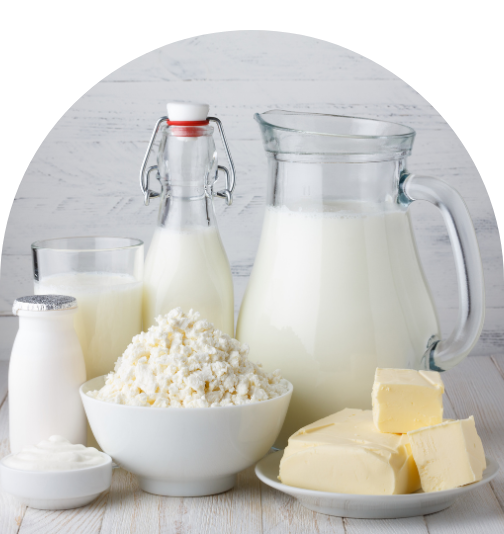Is Banning Dairy the Right Way to Go?
When it comes to optimizing fertility, our food choices play a crucial role. Among the various factors affecting reproductive health, dairy consumption has attracted attention in recent years. From a functional medicine standpoint, understanding the differences between A1 and A2 types of milk is essential to making informed decisions. This article explores the potential drawbacks of dairy consumption on fertility and delves into the unique qualities of A1 and A2 milk.
The Great Dairy Debate
Dairy products have long been touted as a rich source of essential nutrients, including calcium and vitamin D. However, from a functional medicine perspective, dairy can pose challenges for individuals seeking to enhance fertility. Several factors contribute to this standpoint.
- Inflammatory Response
Dairy, particularly cow’s milk, contains proteins such as casein. The two primary variants of casein, A1 and A2, differ in their amino acid structures. Studies suggest that A1 casein can trigger an inflammatory response in the body, which may disrupt hormonal balance and impede reproductive health. We’ll break down the differences between A1 and A2 types of milk later in this article.
- Lactose Intolerance
Lactose, the natural sugar found in milk, can cause digestive issues in individuals with lactose intolerance. These individuals experience difficulty digesting lactose due to insufficient production of the enzyme lactase. Digestive distress can lead to inflammation and nutrient malabsorption, potentially affecting fertility.
Dairy’s Implications on Fertility
The relationship between dairy consumption and fertility or conception is a complex and multifaceted topic. While dairy products contain important nutrients such as calcium, vitamin D, and protein, there are potential ways in which dairy consumption may affect fertility. Here are some examples:
- Hormonal Imbalance: Dairy products, particularly those derived from conventional cow’s milk, may contain hormones and growth factors. These substances can interfere with the body’s natural hormone balance, potentially affecting ovulation and menstrual cycles.
- Inflammation: Certain individuals may experience inflammation or sensitivity to components found in dairy products, such as lactose or protein casein. Chronic inflammation in the body can disrupt reproductive processes and decrease fertility.
- Insulin Resistance: Some studies suggest that consuming high amounts of dairy products, especially those with higher fat content, may contribute to insulin resistance. Insulin resistance can impact hormone regulation and ovulation, potentially affecting fertility.
- Lactose Intolerance: Lactose intolerance is the inability to digest lactose, the sugar found in milk and dairy products, due to insufficient lactase enzyme production. Digestive discomfort and inflammation associated with lactose intolerance may indirectly impact fertility.
It’s important to note that the impact of dairy consumption on fertility can vary among individuals. Some people may tolerate dairy well and experience no adverse effects on fertility, while others may be more sensitive. Individual factors such as genetics, overall diet, and underlying health conditions also play a role in how dairy affects fertility. If you choose to limit or give up dairy, focus on a well-balanced, nutrient-rich diet that includes alternative sources of essential nutrients found in dairy. Calcium (from leafy greens, almonds, or fortified plant-based milk) and vitamin D (through sunlight exposure or supplementation) can support overall reproductive health.
If you are concerned about the potential impact of dairy consumption on fertility and conception, consider asking one of us; Dr. Christina and I are functional medicine physicians specialized in reproduction and fertility. We can help evaluate your specific circumstances, conduct relevant tests, and provide personalized recommendations based on your unique needs and goals. If you’d like to explore working with us on your fertility, watch our free, on-demand masterclass here and be more informed on your preconception journey.
If you’d like to learn more about what it looks like to work with us, click here to watch our free, on-demand masterclass and discover the proprietary 4R Fertility FormulaTM we use to help you get pregnant naturally or get better results with IVF and IUI.
A1 vs. A2 Milk
The key distinction between A1 and A2 milk lies in the type of beta-casein protein present. Traditional breeds of cows, such as Jersey and Guernsey, produce A2 milk, while modern breeds, including Holstein, predominantly produce A1 milk. The following factors shed light on the differences between these two milk types:
1. Beta-Casein Structure:
A1 and A2 beta-casein proteins differ by a single amino acid. When A1 milk is digested, it releases a peptide called beta-casomorphin-7 (BCM-7). Research suggests that BCM-7 may have inflammatory properties and could potentially disrupt various bodily processes, including fertility.
2. Potential Benefits of A2 Milk:
A2 milk, with its distinct protein composition, has been associated with several potential benefits. Some research suggests that A2 milk may be easier to digest, reducing the likelihood of digestive discomfort and inflammation. While more research is needed, anecdotal evidence suggests that individuals intolerant to A1 milk may tolerate A2 milk better.
Finding A2 milk products here in the United States may require some effort, as A2 milk is not as widely available as conventional dairy products. However, the demand for A2 milk has been increasing, and it is becoming more accessible in certain regions. Some places to seek out when on the hunt for A2 milk:
- Local Farms: Start by exploring local dairy farms in your area. Traditional cow breeds such as Jersey, Guernsey, and Brown Swiss are known to produce A2 milk. Contact local farmers directly or visit farmer’s markets to inquire about A2 milk availability.
- Specialty Health Food Stores: Some health food stores or specialty grocers may carry A2 milk products. Check with stores that focus on organic or natural products, as they are more likely to offer A2 milk options. Call ahead or visit their websites to see if they stock A2 milk.
- Online Retailers: Several online retailers specialize in delivering A2 milk and related products. They source A2 milk from various dairy farms and deliver it to your doorstep. Search for “A2 milk delivery” or “A2 milk online” to find options available in your area.
- Co-ops and Buying Clubs: Cooperative grocery stores or buying clubs often cater to individuals seeking niche or specialty products. These establishments may carry A2 milk or be open to special requests. Inquire with your local co-op or buying club to explore A2 milk availability.
- Direct-from-Farm Programs: Some dairy farms offer direct-from-farm programs, where customers can subscribe to regular deliveries of farm-fresh products, including A2 milk. These programs typically operate within specific regions. Research local farms in your area and inquire about any direct-from-farm programs they offer.
Remember, availability may vary depending on your location. It’s essential to research and contact local sources to determine the availability of A2 milk products. As consumer demand for A2 milk increases, it is possible that larger supermarket chains may start stocking A2 milk in the future.
Always check the packaging or inquire with the supplier to ensure the product is labeled specifically as A2 milk. Some dairy products may claim to be from A2 cows, but unless they are explicitly labeled as A2 milk, they may still contain a mixture of A1 and A2 proteins.
Considerations for Fertility Optimization
- Dairy Alternatives:
For those concerned about the potential drawbacks of dairy on fertility, exploring dairy alternatives is worth considering. Plant-based milk such as almond, soy, or oat milk can offer a range of nutrients while eliminating the potential inflammatory response and digestive issues associated with dairy consumption.
- Focus on Nutrient Density:
Prioritize nutrient-dense foods to support reproductive health. Emphasize sources of calcium, vitamin D, omega-3 fatty acids, and other key nutrients found in dairy. Dark leafy greens, fatty fish, nuts, and seeds can provide these essential nutrients while offering additional health benefits.
- Individualized Approach:
Every person’s body is unique, and responses to specific foods can vary. As functional medicine practitioners, we can help you identify sensitivities and develop personalized dietary plans that optimize your fertility based on comprehensive assessments and tailored recommendations.
Conclusion
From a functional medicine perspective, dairy consumption may not be the ideal choice for individuals seeking to optimize fertility. The inflammatory response triggered by A1 milk and the potential digestive issues associated with lactose intolerance are factors to consider. Exploring A2 milk or dairy alternatives, along with a focus on nutrient-dense foods, can provide a foundation for supporting reproductive health. Remember, each person
Dr. Christina and I are functional medicine MDs who specialize in fertility. We’d love to help you on your journey to build the family of your dreams! Check out our free, on-demand masterclass and discover the proprietary 4R Fertility FormulaTM that we use to help couples get pregnant naturally (even after failed IVF or IUI!).








